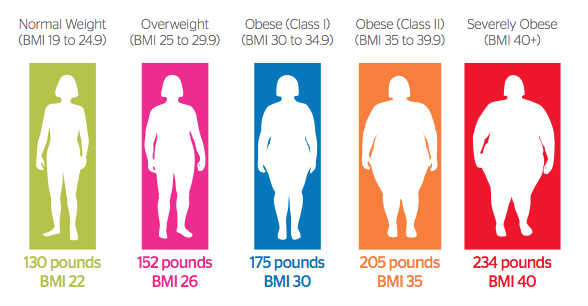Characteristics of Morbidly Obese
1. What is Morbid Obesity
A person is morbidly obese when their excess body fat is at a level that has become a danger to their health and life expectancy.
Morbid obesity is caused by several factors. It is not the same to being overweight or obese for these two conditions are less life-threatening in comparison.
People who are morbidly obese can suffer from several other certain ailments related to their weight.
2. Morbid Obesity Has Become a Global Issue
Since the 1980s weight problems have been on the rise worldwide.
It affects developed countries just as well as it affects developing and undeveloped countries. The most concerning trend is the rise of obesity in children.
In China, the government has calculated that the childhood obesity rate is at 10% in children living in urban areas. In Japan, the childhood obesity rate has tripled.
3. Risk Factors for Morbid Obesity
While it is true that anyone can become obese and even morbidly obese, certain people are at much higher risk.
It is because genetics can also play a big role in predisposing a person to obesity.
If either or both of your parents and grandparents (maternal or paternal) are obese, there is a greater likelihood that you will struggle with obesity as well.
4. Main Causes of Morbid Obesity
Consumption of much calories and not having enough activity during each course of your day are two main causes of morbid obesity.
After you consume food, your body processes it for energy meant for your muscles and other body tissues for use.
When the calories you consume is greater than the amount of calories used each day, your body stores remaining calories in fat cells.
When you continue to have an excess in the amount of unused calories each day, fat storage increases and you gain more and more weight. It eventually predisposes you to becoming overweight, obese and if this continues, morbidly obese.
Stress, inactivity, medications, anxiety and lack of good sleep are also major contributors.
5. How You Can Prevent Morbid Obesity
Avoid fad diets and fad exercise routines. Instead find a diet and exercise routine that you can live with the rest of your life.
The entire process will be a period of trial and error experience of trying different things until you find out what works best for you.
Some key things to try may include: (a) smaller portions of food, more frequently rather than three large meals, (b) more fruits and vegetables, (c) avoiding trans fats, (d) limiting saturated fats, and (e) avoiding refined sugars and carbohydrates.
Getting as much physical activity whenever and wherever possible throughout the day in order to burn as many calories can provide a big boost in its prevention.
6. What To Expect When Visiting Your Healthcare Provider
First and foremost, if you are a new patient, expect a complete history screening which includes family history, dietary and exercise habits, and answering questions on any symptoms.
Your healthcare provider will also run tests to diagnose causes that may have resulted out of being morbidly obese.
7. Diagnosing Your Morbid Obesity
With a calculation known as the BMI (Body Mass Index), your doctor will check whether your weight is within specific ranges: normal, overweight, obese or morbidly obese.
Other tests include measuring your body fat percentage using a skin-fold testing method and blood testing to check for hormonal issues or other medical conditions that may be contributing to your weight issues.
8. Complications of Morbid Obesity
Untreated morbid obesity can lead to medical problems including: diabetes, stroke, osteoarthritis, heart disease, cancer, hypertension, and sleep apnea.
9. How Morbid Obesity Affects Your Quality of Life
Obesity and especially morbid obesity can greatly diminish your quality of life. You will find that you are unable to do many things that you once were able to.
Effects on quality of life may also include: shame, disabilities, depression, social isolation and sexual problems.
You may also find yourself discriminated against many areas of your life like employment and social involvement.
10. Treatments for Morbid Obesity
Diet and exercise are the most effective ways to treat morbid obesity.
A healthy lifestyle of having good eating habits, exercise and sleep can help bring about the needed weight loss.
For those who find that changes in lifestyle does not seem to bring effective results, weight loss drugs or surgery may be necessary.
- READ MORE




